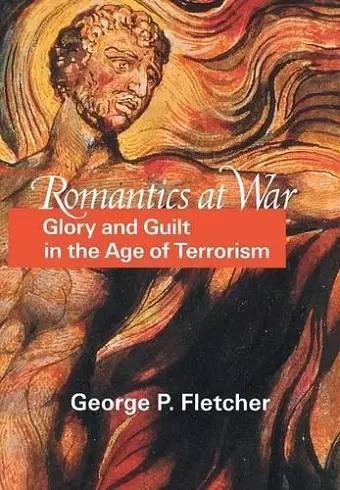Romantics at War
Glory and Guilt in the Age of Terrorism
Format:Hardback
Publisher:Princeton University Press
Published:25th Oct '02
Should be back in stock very soon

This is a first-rate book. Fletcher is doing what he does best--reformulating basic legal problems by putting them in a distinctive philosophical perspective. The book suggests that we are getting beyond the first stage of encounter with September 11 and to a second phase in which we struggle to integrate the tragedy into a deeper understanding of law and morality. -- Bruce Ackerman, Yale Law School Lawyers and foreign policy commentators are unlikely to see themselves as romantics. Contemporary issues of war and peace, terrorism and justice, justification and guilt surely require 'reasoned analysis' rather than the dissection of emotion. But our analysis too often falls short when contending with the potent mix of horror, grief, and patriotism that has fueled the U.S. response to September 11. George Fletcher has done us all a service, drawing out the contradictions between the dignity of individuals and the honor of nations in ways that cannot even be fully grasped without appreciating the intertwining of Enlightenment rationalism and nineteenth-century romanticism. Romantics at War should be read by all self-professed rationalists, as both intellectual inquiry and self-examination. -- Anne-Marie Slaughter, Princeton University George Fletcher has written a deep and engaging meditation on a simple fact: that we live in political collectives and rarely act with full autonomy. With a lawyer's gift for expounding his cases, he gives us a wonderfully unlawyerly account, a philosophical investigation, of individual agency, responsibility, and guilt. -- Michael Walzer, Institute for Advanced Study
America is at war with terrorism. Terrorists must be brought to justice. We hear these phrases together so often. This book focuses on the unfolding debates about how to pursue war and justice in the age of terrorism. It seeks to explain why Americans - for so many years cynical about war - have found war so appealing.America is at war with terrorism. Terrorists must be brought to justice. We hear these phrases together so often that we rarely pause to reflect on the dramatic differences between the demands of war and the demands of justice, differences so deep that the pursuit of one often comes at the expense of the other. In this book, one of the country's most important legal thinkers brings much-needed clarity to the still unfolding debates about how to pursue war and justice in the age of terrorism. George Fletcher also draws on his rare ability to combine insights from history, philosophy, literature, and law to place these debates in a rich cultural context. He seeks to explain why Americans--for so many years cynical about war--have recently found war so appealing. He finds the answer in a revival of Romanticism, a growing desire in the post-Vietnam era to identify with grand causes and to put nations at the center of ideas about glory and guilt. Fletcher opens with unsettling questions about the nature of terrorism, war, and justice, showing how dangerously slippery the concepts can be. He argues that those sympathetic to war are heirs to the ideals of Byron, Fichte, and other Romantics in their belief that nations--not just individuals--must uphold honor and be held accountable for crimes. Fletcher writes that ideas about collective glory and guilt are far more plausible and widespread than liberal individualists typically recognize. But as he traces the implications of the Romantic mindset for debates about war crimes, treason, military tribunals, and genocide, he also shows that losing oneself in a grand cause can all too easily lead to moral catastrophe. A work of extraordinary intellectual power and relevance, the book will change how we think not only about world events, but about the conflicting individualist and collective impulses that tear at all of us.
"A thoughtful analysis of the legal, cultural and philosophical issues we face generally in times of war and, particularly, in the post-September 11 world... Fletcher is a very serious academic who has the ability to support his arguments with a remarkable command of disparate sources."--David C. Wrobel, New York Law Journal
ISBN: 9780691006512
Dimensions: unknown
Weight: 539g
272 pages